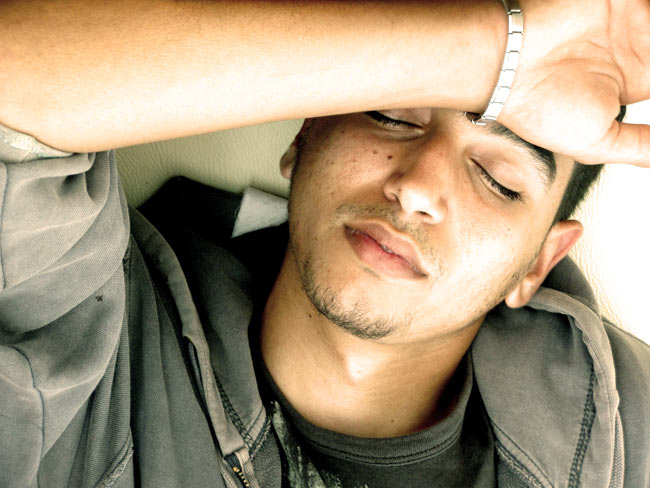Sleep Well: Myth of American Zombies Dispelled

Sleep deprivation has been a watchword in health discussions in recent years, but a new analysis overturns the idea that we're all zombies. Americans get about 8 hours of sleep a night, possibly more in recent years, according to the University of Maryland study, which counters annual polls conducted by the non-profit National Sleep Foundation that show we get only 7 hours nightly or less. The foundation, however, is funded in part by drug companies that make sleep aids. The new study, based on telephone surveys and time-use diaries collected jointly the U.S. Bureau of Labor Statistics and U.S. Census Bureau, as well as time-use diaries collected by UM researchers, also finds Americans average as much sleep nowadays as they did 40 years ago. "Lots of people might feel like they're on a 24/7 treadmill," said study leader John P. Robinson, a UM sociologist. "But the picture of the typical American as sleep-starved is not consistent with what they report in their time diaries." The average amount of sleeping time for adults increased about 3 hours per week in the past decade, up from 56 hours (8 hours/night) to 59 hours (8.4 hour/night), said Robinson, whose UM colleague Steven Martin noted he is cautious about that increase and is waiting to see if it holds up in the long-run. The researchers also warned that the results should not be used to minimize the problems faced by people with insomnia or truncated sleep. The study, "Not So Deprived: Sleep in America, 1965-2005," was announced last week. The latest version is unpublished. An earlier version was presented at the International Association of Time Use Researchers meeting in October 2007 and detailed the same month in an online magazine Public Opinion Pros. (The magazine posted its final issue in December.) Different approaches The UM study and the Sleep Foundation's latest report agree that our jobs are the main reason we get less sleep than we might hope, but the research methods for each study differ. The UM study's federal data — telephone surveys conducted annual between 2003 and 2005 of more than 37,000 adults ages 18 to 64 who described their activities the previous day, hour-by hour — were compared with data from time diary research collected by Robinson between 1965 and 2001 at roughly 10-year intervals. The number of people studied at each interval ranged from 1,200 to 10,000. In contrast, the latest figures from the Sleep Foundation are based on telephone interviews conducted between September 2007 and November 2007 with a targeted random sample of 1,000 Americans at least 18 years old and working 30 hours a week or more for pay. That study found subjects got an average of 6 hours and 40 minutes of sleep per night on weeknights. The Sleep Foundation's subjects were employed whereas Robinson's study included employed and unemployed subjects. "That may cut the difference down a few hours, but I don't think it's going to make all the difference," Robinson said. The Foundation has no historical data across the decades, as Robinson does, but Sleep Foundation board member Christopher Drake questioned the time-use methodology used by the UM team. "The time estimates that [Robinson] gets for sleep are probably somewhat of an overestimation because of the fact that in those estimations of sleep, they include things like insomnia, tossing and turning, lying awake, counting sheep, I could go on," said Drake, a clinical psychologist and sleep researcher at the Henry Ford Hospital Sleep Disorders and Research Center, in Detroit, Mich. Robinson stood by his estimate. "The hours are there," he told LiveScience. "It still could be that people are not sleeping well, maybe getting up in the middle of the night and not reporting it, but I don't think it's likely to make much of a difference." Drake said all sleep time estimates are subjective. "Until we can get accurate physiological measures of sleep on large numbers of people over time, we aren't going to be able to answers these questions definitely," he said. Funding issues Robinson's study was funded by the University of Maryland. The federal data that he analyzed was paid for by tax dollars. The Sleep Foundation is funded by donors, members and grants, among other sources. Supporters for 2007-2008 include Actelion Pharmaceuticals (which has been developing an experimental sleeping aid), Eli Lilly and Company (maker of the barbiturate Seconal), GlaxoSmithKline (which makes Sominex and reportedly will market a sleeping aid under the name Lunivia), Novartis (which makes Excedrin PM), Respironics (which makes breathing-assistance machines for people with sleep apnea), Sealy (the mattress company) and Sepracor (which owns the sleeping aid drug Lunesta). The Foundation estimates it gets about 40 percent of its funding from healthcare companies. The Foundation's polls are conducted independently of granting organizations, which have no say about the direction of the poll and questions asked. "We identify the direction of the poll, what segment we're going to target," Drake said.
- 10 Easy Paths to Self-Destruction
- The Most Popular Myths in Science
- Why Do We Sleep?
Get the world’s most fascinating discoveries delivered straight to your inbox.
Robin Lloyd was a senior editor at Space.com and Live Science from 2007 to 2009. She holds a B.A. degree in sociology from Smith College and a Ph.D. and M.A. degree in sociology from the University of California at Santa Barbara. She is currently a freelance science writer based in New York City and a contributing editor at Scientific American, as well as an adjunct professor at New York University's Science, Health and Environmental Reporting Program.



